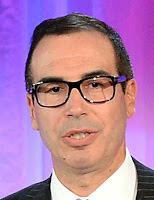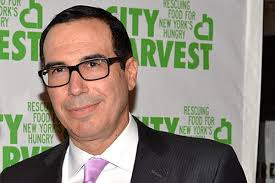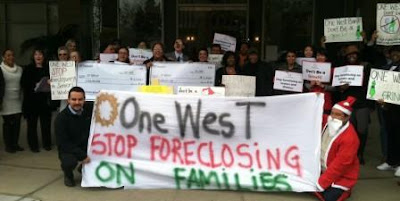by Nomad
If you -or somebody you know- happened to be one of the thousands of victims of home foreclosure in the wake of the economic meltdown of 2008, here's why Donald Trump's choice for his finance manager, Steven Mnuchin, is a slap in your face.
In fact, all Americans ought to be furious.
Trump's Wall Street Hypocrisy
Days after locking up the Republican presidential nomination in May, Donald Trump named Steven Mnuchin as his national finance chairman.
The press release states that Mnuchin "has previously worked with Mr. Trump in a business capacity and brings his expertise in finance to what will be an extremely successful fundraising operation for the Republican Party."
In many ways, it was a bewildering and disturbing choice for a candidate who had consistently portrayed himself - to his angry middle-class supporters- as a bitter foe of Wall Street excesses.
Indeed, Wall Street once trembled at the possibility of Trump getting the nomination. Months before, in September 2015, one political strategist put it like this :
"He has bought into the populist rhetoric that Wall Street is greedy and makes too much money...He sounds more anti-Wall Street than Elizabeth Warren."
That was, of course, before Trump was officially crowned the Republican nominee. After the GOP nomination was sealed up, Trump surprised everybody by jumping in bed with the very people he had castigated.
Goldman, Sachs in the Mnuchin Bloodline
After all, Mnuchin's connections to Wall Street are practically genetic. His father, Robert E. Mnuchin, spent a greater part of three decades on Wall Street at Goldman, Sachs & Company. He was, in fact, one of the pioneers of the institutional equity trading business in the 1960's. Before his retirement in 1990, Robert Mnuchin was "one of the most important figures in the equities business."
(Incidentally, Investopedia cites a crash in equity trading as major factors in two periods of economic decline, the Great Depression of 1929 and the Great Recession of 2008.)
Since its inception, Goldman is a firm that has come to symbolize the power and influence of Wall Street. Thus, Trump's selection of Mnuchin is impossible to reconcile to the candidate's rhetoric on Wall Street. Moreover, Trump has used the company to hammer away at his opponents.
Mr. Trump spent much of his campaign attacking Goldman Sachs, using the bank to malign Ted Cruz’s wife, Heidi, who is an investment manager there, and Mrs. Clinton, who famously received rich honorariums for giving speeches there.

Like his father, Yale University graduate Mnuchin started out in the employ of Goldman Sachs. And he did very well. After 17 years, he had amassed a tidy fortune of $46 million.
By 2004, Mnuchin had struck out on his own, launching his own hedge fund, Dune Capital Management LP with a few of his friends from Goldman Sachs.
Dune Capital was, in fact, a spin-off of Soros Capital Management. The liberal New York financier, George Soros, put down an investment fund of $1 billion to get the company on its feet.
Mighty strange.
Ask any conservative and he will tell you that Soros is the billionaire promoter of a One World Order, an anti-Zionist and an anti-constitutional funder of all things unholy. At one point in the campaign, a conservative website actually accused Soros of buying protestors to send to his rallies to conduct "a free speech-busting goon squad operation."
And yet, Trump's finance manager owes his first big break to this very man, the conservative right wing's favorite boogeyman.
Mnuchin would later start an entertainment finance company called Dune Entertainment. After that, Mnuchin's company would go on to form one-third of RatPac-Dune Entertainment through a 2013 merger with producer-director Brett Ratner, his partner billionaire James Packer.
That company went on to finance a number of hit films, including the X-Men film franchise and Avatar.
The Firesale
Let's not get ahead of ourselves.
In 2009, as the US economy was turning to sludge, Mnuchin became Chairman of IMB Holdco LLC, a limited partnership composed primarily of hedge funds.
Through IMB Holdco, Mnuchin and a group of private investors snapped up the failed housing lender IndyMac for $1.55 billion. It was in fact bought out of Chapter 7 bankruptcy from the F.D.I.C.
IndyMac, or in the long-form, Independent National Mortgage Corporation, had, before the crisis, been the largest savings and loan association in the Los Angeles area and the seventh largest mortgage originator in the United States.
So, in effect, IMB Holdco purchased IndyMac at an FDIC firesale. IMB HoldCo was, as it turned out, the only bidder for all of the IndyMac Bank assets. For good reason.
The failed company had been loaded with bad debt after years of what the Center for Responsible Lending called "unsound and abusive lending during the mortgage boom." An investigation had found that:
The problems at IndyMac were spawned by top-down pressures that valued short-term growth over protecting borrowers and shareholders’ interests over the long haul.
Mnuchin promptly renamed it OneWest Bank and, unsurprisingly, named himself CEO. But there was more to it than just changing the name.
Under the Mnuchin's management, OneWest took a much more aggressive approach to foreclosing on its properties.
It was, critics claimed, the only major bank that refused to join California’s “Keep your Home, California” program, which had attempted to protect homeowners who have suffered a financial hardship, to help them stay in their homes, maintain an affordable mortgage payment and avoid foreclosure.
One foreclosure watchdog group has pointed out that OneWest Bank refused to disclose how many foreclosures it has conducted since purchasing IndyMac Bank in 2009. Suffice to say, a lot of people lost their homes due to OneWest's foreclosure policies.
Some, however, did question the business practices. And they were prepared to fight.Instead, the leadership of the two banks would like to continue processing foreclosures on US families, be reimbursed from the FDIC for doing so, and hope that nobody questions their foreclosure track record..
Taking on the Double Cross
Not unexpectedly, there were a lot of people who were not prepared to leave their homes quietly. According to a New York Time piece,
OneWest was involved in a string of lawsuits over questionable foreclosures, and settled several cases for millions of dollars.
In November 2009, the foreclosure practices of OneWest enraged one Long Island, New York judge, Justice Jeffery Spinner.
He called the bank's tactics “harsh, repugnant, shocking and repulsive.”
In reaction, Spinner wiped out $525,000 in mortgage payments owed by leaving Diane Yano-Horoski and her husband, Greg Horoski, owing absolutely no money on their East Patchogue home.
(That decision was later overturned by appellate judges who ruled found that Judge Spinner had exceeded his authority.)
Mnuchin must have been aware that his companies business practices outraged many Americans. According to one unconfirmed report,
"Notoriously press-shy, the executive endured 2011 protests on the lawn of his Bel Air mansion by foreclosed homeowners angered at his lender's handling of soured mortgages."
In August of 2011, dozens of protesters, angry at the bank’s questionable foreclosure practices, stormed the headquarters of One West Bank in Pasadena, California. Despite that, the public animosity didn't seem to have much of an effect on the business model.
In 2013, a San Luis Obispo County couple, Greg and Irene Rigali, sued OneWest Bank, IndyMac Mortgage Services, U.S. Bank and GSR Loan Mortgage Trust. Their home and a rental property in Grover Beach had been foreclosed at the same time as OneWest Bank was negotiating with them to modify their mortgages.
The case turned on a mortgage practice known as “dual tracking.” Under the practice, lenders work with borrowers who are in default but, at the same time, pursue foreclosure.
One California appellate court years before the Rigali case had this to say about the practice:
“For homeowners struggling to avoid foreclosure, this dual tracking might go by another name: the double-cross.”
According to the court testimony, a notice of foreclosure was posted on the couple’s home’s door while Irene Rigali was en route home from what she had been led to believe was "a successful meeting with bank officials."
The companies quickly agreed to a settlement reportedly in the range of 7 figures.
New laws in California, and throughout the country now legally protect homeowners from dual tracking.
Foreclosure in Human Terms

The Rigali victorious day in court was, unfortunately, an exceptional outcome.
Between 2006 and 2014, more than 9.3 million American families lost their homes, either in a foreclosure or a short sale or some other transaction. That's close to 14 million people, (presumably many of them are deluded Trump supporters.)
One website sponsored by California Reinvestment Coalition (CRC) tracks the ongoing OneWest foreclosure notices starting from March 2015.
Visitors are encouraged to share their experiences and here are a few of their stories:
“OneWest Bank refused to honor my letter of intent to repay the loan and refused to grant me the HUD authorized time to obtain a new loan.”
Another one alleges that because of OneWest Bank and its practices, an elderly victim of foreclosure "was forced to live the last years of her life on Medi-Cal in a nursing home funded by taxpayer dollars.”
An attorney for one of those who received a foreclosure explained:
”Another client I worked with had lived in her home for over 40 years. She is elderly, disabled, and supports her daughter and four minor grandchildren on just her monthly Social Security income. After her husband died, she had trouble maintaining her property tax payments, and OneWest, the parent company of her reverse mortgage lender, Financial Freedom, threatened to foreclose.
One website tracks complaints about Financial Freedom and these tales do not paint a flattering picture of how the company conducted business. Quotes include:
This is a terrible scary company. Their dealings are "iffy" at best - at worst, in my opinion, nearly criminal. Don't let your parent or loved one get tricked into signing ANYTHING with this company. And if they do...get a GOOD attorney.
Another person writes:
They are greedy, heartless bastards and HUD should be ashamed of themselves for instituting and endorsing reverse mortgages.
Even one former employee gave his opinion of the company, calling it "the most ruthless, evil, cutthroat, bloodless, cruel, greedy organization I have ever worked for in my life."
Financial Freedom and the Perfect Prey
Mnuchin and OneWest Bank acquired Financial Freedom as part of the FDIC - IndyMac deal in 2009. Since that time, Financial Freedom has been under a lot of scrutiny when it comes to its reverse mortgage practices.
Reverse mortgage loans are a type of home loan specifically targeting senior homeowners (62 years or older).
Sadly, reverse mortgages have been the downfall of many a senior who may have been confused by the terms of the agreement, especially when presented by trusted authorities.
According to a report to Congress, a majority of respondents to a 2000 survey of elderly Americans failed to understand the financial terms of reverse mortgages very well when securing their reverse mortgages.
Some have claimed that, for scammers, the elderly homeowner presents the perfect "mark." Half of the senior homeowners had at least 55 percent of their net worth tied up in home equity, which has accumulated over a lifetime of mortgage payments and house-price appreciation. A home is, in many cases, the only valuable asset they own.
And for the unscrupulous, that's a prize ripe for the picking.
Regulatory authorities like the Consumer Financial Protection Bureau, have long argued that reverse mortgages are "complex products and difficult for consumers to understand," especially in light of "misleading advertising," low-quality counseling, and "risk of fraud and other scams."
Kevin Stein, associate director of the California Reinvestment Coalition (CRC) stated that his organization was contacted by a number of widowed homeowners and other heirs who shared disturbing stories about Financial Freedom.
Using a FOIA request, we asked Financial Freedom’s primary regulator, HUD, about the total number of foreclosures it had completed, and the number of complaints HUD had received against Financial Freedom.”
The data HUD provided the CRC was "a red flag that something is amiss at Financial Freedom."
While the company services an estimated 17% of the reverse mortgage market, data from HUD indicates that Financial Freedom was responsible for 39% of the 41,237 HECM reverse mortgage foreclosures that occurred since April 2009.
That would be precisely at the time Mnuchin took up the reins of the Financial Freedom's parent company, OneWest.
As of May 2011, Financial Freedom has not originated any new reverse mortgage loans. Since that time, Financial Freedom has focused only on winding down the "servicing portfolio." which means closing out as many of the loans as possible as quickly as possible. One of the reasons that OneWest decided to close Financial Freedom’s reverse mortgage origination business, was the "unfavorable regulatory environment."
And given its shady business practices, that's an interesting way of putting it.
Liquidations and Lucky Guys
In 2009, the fraudulent Trump University was promising that its "Fast Track to Foreclosure Investing" would teach students how to take advantage of the mortgage/foreclosure crisis. A Trump University advertisement proclaimed:
"Cash in on one of the greatest property liquidations in history!"
One of those that cashed in on this liquidation was Steven Mnuchin. And any way you look at it, he made a bundle out of the liquidations.
Last year, OneWest with assets estimated at about $27 billion was sold to CIT Group in 2015 for a staggering $3.4 billion. It was part of a merger that was completed August of that year. Steven Mnuchin joined CIT as vice chairman and a director.
Coincidentally, at the moment of the OneWest merger, candidate Trump appeared on Meet the Press and slammed hedge fund managers. He accused them of "getting away with murder." Trump said:
"The hedge fund guys didn't build this country. These are guys that shift paper around and they get lucky."
By May, when Steve Mnuchin, one of the most successful hedge fund managers, got the offer he couldn't refuse from Trump, he must have felt extremely lucky.
And if Trump is elected, the fortuitous Mnuchin, who made his vast wealth locking people out of their homes, is expected to become Trump's Treasury Secretary.



